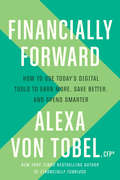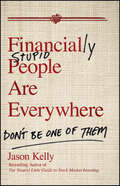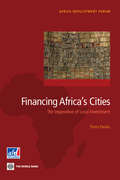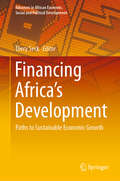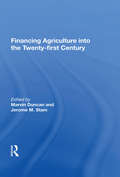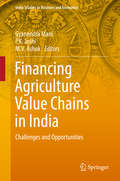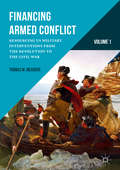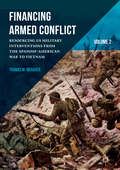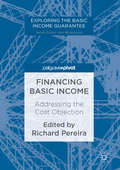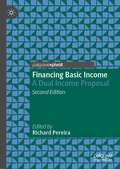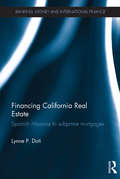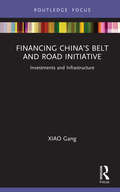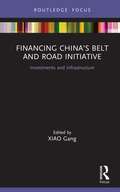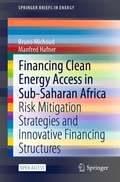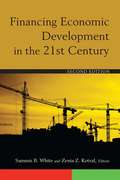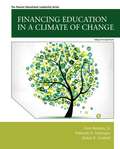- Table View
- List View
Financially Ever After: The Couples' Guide to Managing Money
by Jeff D. OpdykeYour Guide to Managing the Real Dollars—and the Real Emotions—of Your RelationshipToo often with money, couples face two choices: fight and risk making the situation worse, or keep quiet and risk making the situation worse. Financially Ever After offers a third option: family financial fluency—the insight, knowledge, and vocabulary every couple needs to communicate effectively about money.Jeff D. Opdyke, previously The Wall Street Journal's syndicated "Love & Money" columnist, covers any and all financial issues that couples face, including budgeting, deciding on whether to have joint or individual accounts, dividing up family financial chores, confronting debt, making major purchases, as well as handling mortgages, employment, children, and even engagement rings. He offers dozens of real-life scenarios between couples, with scripts and suggestions for how to broach delicate money-related subjects with your significant other, whether he or she has a shaky credit history or is feeling left out of family financial decision-making.The book also provides helpful tools to organize your financial life, such as a budgeting chart, a "scorecard" to track spending, and an "affordability calculator" to help you figure out how much buying a house will cost you.A must-read for any couple starting out, Financially Ever After lays the groundwork for building a healthy and thriving financial life together.
Financially Fearless
by Alexa Von TobelFinally, a financial plan that lets you be YOU, only richer. It's time to throw away all your old notions of what financial advice should look like. Because if you're looking for a book to put you on an austerity savings plan that has you giving up vacations and lattes, you're out of luck. But if you're looking to get your finances in rock-hard shape - in less time than it takes to finish a workout - then Alexa von Tobel, Founder and CEO of LearnVest, has your back.How? Through the LearnVest Program. First, you'll take stock of where you stand today. Then, you'll create your customized 50/20/30 plan. 50/20/30 simply refers to the percentage breakdown of how to spend your take-home pay each month. The 50 gets the essentials out of the way so you don't have to stress about them. The 20 sets your foundation for the future, then the 30 is left to spend on the things that bring happiness to your life.By the time you're finished reading this book, you'll walk away with a financial game plan tailored to your priorities, your hopes and dreams, and your lifestyle. And, because von Tobel and the team at LearnVest are experts at financial planning in the online era, you'll also learn how to integrate your financial plan into your mobile, social, digital life. Like your own personal financial planner between two covers, this book will set you up for a secure, worry-free money future, without having to give up things you love.So toss those old-school financial guides out the window, and get ready to start living your richest life.From the Hardcover edition.
Financially Forward: How to Use Today's Digital Tools to Earn More, Save Better, and Spend Smarter
by Alexa von TobelChief digital officer at Northwestern Mutual, founder/CEO of LearnVest, and New York Times bestelling author shows how to use the simple tools of the digital age to get more out of our money.We live in a new financial world. Our wallets--like every other aspect of our lives--have gone fully digital. From mobile pay to on-demand everything to cryptocurrencies, technology is rewriting the rules for how we earn, save, spend and invest. Technology has made virtually every aspect of our lives cheaper and more convenient. Shouldn't it do the same when it comes to managing our finances?Von Tobel says that it can. In this straightforward and jargon-free guide, she shows us how to use the simple tools found on any smartphone to put more money back into our wallets. Readers will learn: Six new trends that are impacting our finances - and how to optimize them How to navigate the world of mobile pay, and cash in by going cash-free How to save time and money by putting your savings--and spending--on autopilot Best practices for keeping your identity and financial accounts ultra-secure How to talk to digital natives - ie your kids - about financial planning What the Bitcoin hype is all about and how to prepare for the future of digital moneyPreparing ourselves for the financial future gives us the security and freedom to live our richest lives. It's time to move Financially Forward...or get left behind.
Financially Lit!: The Modern Latina's Guide to Level Up Your Dinero & Become Financially Poderosa
by Jannese TorresBuild financial literacy, improve your money management skills, and make the dinero work for you! In many immigrant households, money isn&’t often a topic of discussion, so financial education can be minimal—especially when a family is just trying to survive the day-to-day. Despite being the largest minority group in the United States, the Latino community still faces cultural and systemic barriers that prevent them from building wealth. As a first-generation Latina, Jannese Torres, award-winning money expert, educator, and podcaster, knows these unique challenges well. She set out to pursue the traditional American Dream, becoming the first woman in her family to graduate from college, climb the corporate ladder, and secure the six-figure paycheck, only to find herself miserable and unfulfilled. She soon realized that everything she&’d been taught about money and success wasn&’t as it seemed. After discovering the true meaning of wealth, Torres resolved to pave her own path, leaving the life she was told she should want for one of entrepreneurship, autonomy, and financial freedom. In Financially Lit! Torres offers you culturally relevant and relatable personal finance advice that will allow you to finally feel seen, heard, and understood. Whether it&’s the guilt you feel from being the first person to &“make it&” while members of your family are still struggling, or the way financial trauma manifests itself in negative and limiting beliefs around money, Torres is here to guide you through it all. With the warmth and no-nonsense wisdom of someone who&’s been there before, Torres will teach you how to: set boundaries with your dinero protect yourself from financial abuse navigate the complicated relationship between amor and money invest like a white dude—or better! With Financially Lit! at your side, you&’ll harness the powerful ways money can be used to create the life of your dreams, and be empowered to step into financial freedom.
Financially Stupid People Are Everywhere
by Jason KellyA hard-hitting look at achieving financial freedom by avoiding excessive borrowing and spendingIf you don't actively resist America's culture of debt, you'll end up precisely where the government, banks, and big business want you to be: indentured servitude. The mistakes people make with their money are basic, and avoidable, and unless you understand what they are, you're probably going to repeat them. What you need is someone who can shed light on the obstacles we face and show you how to avoid getting tripped up by them.Financially Stupid People Are Everywhere shows how society is rigged to take as much of your wealth as possible, and simple ways you can resist. It investigates, explains, and offers advice for all those who have fallen into debt, taken a second mortgage, been trapped by credit cards, or found themselves unable to get ahead.Discusses what you can do to stop the destructive cycle of borrowing and spendingIllustrates the four major tenets of getting money rightHighlights how to avoid the many ways that government, banks, and big business try to trap you with debtTo secure your financial future, you must break the dangerous cycle of borrowing and spending, and learn how to guard your wealth against corporate ploys. Financially Stupid People Are Everywhere leads you down the only proven path to financial freedom.
Financiar las palabras: Una guía acerca del dinero y los impuestos para autores
by Alma Edith Garcia Pavarti K. TylerOrganizar tus finanzas personales significa ganar más dinero y ¿quién no quiere ganar más dinero? Los escritores tienden a ser personas con facilidad para las palabras, ¡lo que significa que la temporada de pago de impuestos puede causarles mucha angustia! ¿Has estado tomando todas las medidas necesarias para asegurarte de que puedas maximizar tu devolución? ¿Estás guardando todos tus recibos en una caja de zapatos? ¿Tienes pesadillas llenas de signos de dólares flotando en el aire y mientras te preocupas por todo el dinero que vas a deber después de que por fin termines de declarar impuestos? ¡ Financiar las palabras está aquí para ayudarte! Prepárate para aprender todo lo que jamás hayas necesitado aprender sobre operar tu propio negocio y declarar impuestos como autor y a dedicar tan sólo unas horas a preparar tus registros. Con Pavarti K. Tyler como tu guía, harás un recorrido por los números, aprenderás cuáles gastos son deducibles y cuáles no, te enterarás de trucos para preparar tu empresa como autor y recibirás recomendaciones innovadoras para aplicar tu talento y agregar un poco más de grosor a tu alcancía. Con este guía, recibirás explicaciones prácticas y fáciles de entender acerca de cómo organizar y como administrar tus finanzas, incluyendo: Cómo ser un emprendedor exitoso La regla de impuestos #1 que tienes que saber Ganar dinero y qué hacer con él Los pros y contras de establecer una sociedad Los pagos a diseñadores, editores y otros contratistas Preguntas frecuentes Maximizar tus deducciones Determinar cuáles son tus bienes o activos Ganar dinero por gastar dinero Contratar a un profesional de impuestos o presentar tu declaración tú mismo ¡También ofrecemos nueve regalos exclusivos para los lectores de este libro! Nuestra garantía: ¿Estás cansado de examinar meticulosamente las guías de marketing que se centran más en la experienc
Financing Africa's Cities
by Thierry PaulaisThis volume addresses the issues of financing urban growth of the African continent -- which has the highest urban growth rate on the planet -- in the next decades. Considerable investment will be needed to sustain this level of growth and to clear up accumulated backlogs. At the same time, decentralisation has resulted in increased responsibilities for local government; but in most cases, institutional reforms were carried out without the transfer of a sufficient level of resources, and local capacities in governance and project management are weak. Which mechanisms will finance these extensive needs, and how will African local governments meet these needs? Specifics on how to finance African cities have not been studied. The actual scale of this market has not been fully grasped. A systemic approach to this market is difficult because of its diversity (country size; institutional context; characteristics of urban network; availability of capital market, currency, etc. ) and a lack of data. Donors' assistance methods in the sector are disparate, marked by disputes between different schools of thought; special-purpose vehicles created by donors operate according to a variety of methods and with wide-ranging and sparsely disseminated results. What is the best way to transform these systems, often antiquated in many respects, into modern financing systems that facilitate access to domestic markets, mobilize local savings and reinforce local government autonomy? There is no single answer to this question in regard to such a variety of institutional and economic contexts. The main objective of the study is to clarify the debates and to enlighten the choices of African decision-makers at local and national level.
Financing Africa’s Development: Paths to Sustainable Economic Growth (Advances in African Economic, Social and Political Development)
by Diery SeckThis book examines the impact of financing on Africa’s economic development. By exploring various financial instruments including the role of alternative sources of funding like migrant remittances and illicit flows, it analyses the role of financing for Africa’s macroeconomic development and other development indicators such as infrastructure, transport, global trade, industrialisation, social services, external indebtedness and governance. By presenting and examining case studies on various African countries and regions, the respective contributions investigate the capacity of institutions to facilitate and structure the economy’s funding activities, and to strengthen the ties between finance and development. Furthermore, they discuss various regional aspects, such as the integration of infrastructure, harmonization of fiscal policy, integration of financial markets, and the facilitation of intra-regional trade and movement of capital. Given its scope, the book will appeal to scholars of economics and development studies with an interest in the economic development of Africa.
Financing Agriculture Into The Twenty-first Century
by Marvin DuncanThis volume is concerned with the paradigm shifts occurring in U.S. agriculture and its related financial services sector. The U.S. agricultural sector is undergoing rapid change with large segments commonly described as industrialized. Often observers focus on the technological and structural changes that the sector is undergoing and ignore other
Financing Agriculture Value Chains in India
by P. K. Joshi Gyanendra Mani M. V. AshokThis book examines the successful private, public and civil society models of agriculture value chains in India and addresses relevant challenges and opportunities to improve their efficiency and inclusiveness. It promotes the value-chain approach as a tool to improve access to finance for small holder farmers and discusses the possible structure of and regulatory framework for the 'National Common Agricultural Market'-- a term that featured in the Indian Finance Minister's 2014-15 budget speech, and which is aimed towards standardizing and improving transparency in agricultural trade practices across states under a single licensing system. The book deliberates on the potential of developing innovative financial instruments into the value chain framework by supporting tripartite agreements between producers, lead firms and financial institutions. Its fourteen chapters are divided into three parts--Agriculture Value Chain Financing: Theoretical Framework, Agriculture Value Chain Financing in Cases of Select Commodities; and Institutional Framework for Agriculture Value Chain Financing. Since the concept of value chain financing is being considered as a future policy agenda, the book is of great interest to corporations dealing with agricultural inputs and outputs; commercial, regional, rural and cooperative banks; policy makers; academicians and NGOs.
Financing American Higher Education in the Era of Globalization
by Joni E. Finney James B. Hunt Jr. William Zumeta Patrick M. Callan David W. BrenemanThis ambitious book grows out of the realization that a convergence of economic, demographic, and political forces in the early twenty-first century requires a fundamental reexamination of the financing of American higher education. The authors identify and address basic issues and trends that cut across the sectors of higher education, focusing on such questions as how much higher education the country needs for individual opportunity and for economic viability in the future; how responsibility for paying for it is currently allocated; and how financing higher education should be addressed in the future.
Financing American Higher Education in the Era of Globalization
by Joni E. Finney William Zumeta Patrick M. Callan David W. BrenemanThis ambitious book grows out of the realization that a convergence of economic, demographic, and political forces in the early twenty-first century requires a fundamental reexamination of the financing of American higher education. The authors identify and address basic issues and trends that cut across the sectors of higher education, focusing on such questions as how much higher education the country needs for individual opportunity and for economic viability in the future; how responsibility for paying for it is currently allocated; and how financing higher education should be addressed in the future.
Financing Anghami's Growth
by Ramana Nanda Eren KuzucuIn December 2012, less than two years into the founding of their music-streaming platform Anghami, cofounders Elie Habib and Eddy Maroun found themselves evaluating an unorthodox term sheet. Habib and Maroun needed to make a decision vis- -vis the proposal put forth by the MBC Group, the region's largest media network. The offer was a media-for-equity deal, which would provide Anghami with advertising towards the media giant's millions of viewers and boost its chances of competing with the likes of iTunes and Spotify in the Middle Eastern market. However, the deal would also cost the cofounders a significant share of their company, and might place them in the middle of a rivalry between MBC and Rotana, the region's largest music label. The case takes the reader through the co-founders' journey, from the founding of the company to the successes and challenges they have faced navigating product launch, scale-up, and partnerships.
Financing Armed Conflict, Volume 1
by Thomas M. MeagherThis first part of a two-volume series examines in detail the financing of America's major wars from the American Revolution to the Civil War. It interweaves analyses of political policy, military strategy and operations, and war finance and economic mobilization with examinations of the events of America's major armed conflicts, offering useful case studies for students of military history and spending policy, policymakers, military comptrollers, and officers in training.
Financing Armed Conflict, Volume 2
by Thomas M. MeagherThis second part of a two-volume series examines in detail the financing of America's major wars from the Spanish-American War to the Vietnam War. It interweaves analyses of political policy, military strategy and operations, and war finance and economic mobilization with examinations of the events of America's major armed conflicts, offering useful case studies for students of military history and spending policy, policymakers, military comptrollers, and officers in training.
Financing Basic Income
by Richard PereiraThis Palgrave Pivot argues that basic income at a decent level is, in fact, affordable. The contributors approach the topic from the perspectives of three different countries--Canada, Switzerland, and Australia--to overcome objections that a universal program to keep all citizens above the poverty line would be too expensive to implement. They assess the complex array of revenue sources that can make universal basic income feasible, from the underestimated value of public program redundancies to new and so far unaccounted publicly owned assets.
Financing Basic Income: A Dual Income Proposal (Exploring the Basic Income Guarantee)
by Richard PereiraThis Palgrave Pivot second edition argues that basic income is, in fact, affordable. The contributors approach the topic from the perspectives of three different countries—Canada, Switzerland, and Australia—to overcome objections that a universal program to keep all citizens above the poverty line would be too expensive to implement. They assess the complex array of revenue sources that can make universal basic income feasible, from the underestimated value of public program redundancies to new and so far, unaccounted publicly owned assets.This new edition adds an analysis for financing basic income in the United States, as well as considering the basic income potential in a country of far more modest economic resources, Portugal. The COVID-19 pandemic is discussed in a new Prologue, demonstrating the need for universal economic security as a precautionary measure for unforeseen crises. New research and compelling analyses are included throughout, to provide support for a dual basic income proposal.
Financing California Real Estate: Spanish Missions to subprime mortgages (Banking, Money and International Finance)
by Lynne P. DotiCalifornia was at the epicentre of the collapse of the real estate market in 2008, which had a devastating effect on the world economy. Taking this diverse and powerful state as a case study, this book presents a financial history of the property business, from the time Spanish Missions were established to the Great Recession. Financing California Real Estate provides the history of expansions and contractions in the real estate market, and describes factors in the state and nation which may have triggered changes in the direction of growth in real estate lending. It explores how financial institutions which provided funding for building and buying homes changed over time, from the establishment of Spanish Missions in 1769, to the Gold Rush, to rail transportation, all the way through to the real estate bubble that peaked in 2005. Using detailed information on financial institutions to explain the changing nature of the real estate market, this book ultimately suggests an alternative theory for what led to the Great Recession. This book will be of interest to researchers working in the area of real estate cycles in the economy, historians interested in the economy of California, and financial historians.
Financing China’s Belt and Road Initiative: Investments and Infrastructure (China Finance 40 Forum Books)
by XIAO GangCentering on the investment and financing infrastructure of China’s Belt and Road Initiative (BRI), this book puts forth the basic principles and general objectives of constructing a new investment and financing system of this magnitude. Beginning with a succinct analysis of the practical issues faced while developing the BRI’s investment and financing system, the author puts forward several approaches to optimizing and reestablishing the system for the further advancement of investment and financing among and beyond the Belt and Road countries. Topics include credit rules, management and control systems, investment protection, dispute settlement and risk assessment while establishing a new mechanism that helps resolve debt defaults, checks for potential corruption and bribery, fosters new growth, and enhances information transparency. The book will be a practical reference for researchers interested in the Belt and Road Initiative and world investment and finance, as well as policymakers, financial institutions and enterprises relevant to the BRI.
Financing China’s Belt and Road Initiative: Investments and Infrastructure (China Finance 40 Forum Books)
by Xiao GangCentering on the investment and financing infrastructure of China's Belt and Road Initiative (BRI), this book puts forth the basic principles and general objectives of constructing a new investment and financing system of this magnitude. Beginning with a succinct analysis of the practical issues faced while developing the BRI's investment and financing system, the authors put forward several approaches to optimizing and reestablishing the system for the further advancement of investment and financing among and beyond the Belt and Road countries. Topics include credit rules, management and control systems, investment protection, dispute settlement and risk assessment while establishing a new mechanism that helps resolve debt defaults, checks for potential corruption and bribery, fosters new growth, and enhances information transparency. The book will be a practical reference for researchers interested in the Belt and Road Initiative and world investment and finance, as well as policymakers, financial institutions and enterprises relevant to the BRI.
Financing Clean Energy Access in Sub-Saharan Africa: Risk Mitigation Strategies and Innovative Financing Structures (SpringerBriefs in Energy)
by Manfred Hafner Bruno MichoudThis open access book analyses barriers and challenges associated with the financing of clean energy access in sub-Saharan Africa. By considering various economic, financial, political, environmental and social factors, it explores the consequences of energy poverty across the region and maps the real and perceived investment risks for potential capital providers, both domestic and international. Furthermore, it analyses risk mitigation strategies and innovative financing structures available to the public and private sectors, which are aimed at leveraging capital in the clean energy sector at scale and fostering the creation of an enabling business and investment environment.More specifically, the present book analyses how to (i) enhance capital allocation in projects and organisations that foster clean energy access in the region, (ii) mobilize private capital at scale and (iii) decrease the cost of financing through risk mitigation strategies. Going beyond traditional approaches, the book also considers socioeconomic and cultural aspects associated with investment barriers across the subcontinent. Moreover, it urges the public and private spheres to become more actively involved in tackling this pressing development issue, and provides policy recommendations for the public sector, including proposals for business model evolution at multilateral agencies and development institutions. It will appeal to a wide readership of both academics and professionals working in the energy industry, the financial sector and the political sphere, as well as to general readers interested in the ongoing debate about energy, sustainable development and finance.
Financing Curtis LLP
by Nikolaos TrichakisThis is a follow-up case to "Curtis LLP: A Case on Cases." It explores the challenges facing debtors when dealing with borrowing firms that have operational flexibility.
Financing Economic Development in the 21st Century
by Sammis B. White Zenia Z. KotvalThe fully revised new edition of this textbook presents a well-balanced set of economic development financing tools and techniques focused on our current times of economic austerity. While traditional public sector techniques are evaluated and refocused, this volume emphasizes the role of the private sector and the increasing need to bring together different techniques and sources to create a workable financial development package. The chapters address critical assessments of various methods as well as practical advice on how to implement these techniques. New chapters on entrepreneurship, the changing nature of the community banking system, and the increasing need for partnerships provides critical insights into the ever-evolving practice of economic development finance.
Financing Education In A Climate Of Change (Twelth Edition)
by Vern R. Brimley Deborah A. Verstegen Rulon R. GarfieldThis is the eBook of the printed book and may not include any media, website access codes, or print supplements that may come packaged with the bound book. This new edition of the classic text in the field of school finance retains the practical tone and superior presentation that made the previous editions best sellers, while presenting the most up-to-date information and material available on key subjects. Here readers get a firm, balanced look of all facets of financing education, clarified and reinforced through numerous clear tables, figures, and key concept lists, and a tone and presentation that illustrates even the most difficult concepts. The new Twelfth Edition of Financing Education in a Climate of Change includes information on hot button topics such as the economics of education, recent court decisions 50-state comparison tables, the Common Core State Standards, and the ongoing debate about school vouchers, tax credits, and charter schools.


